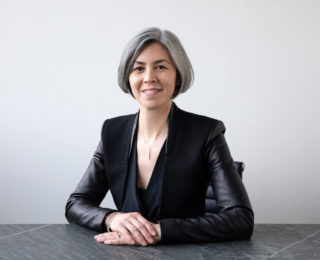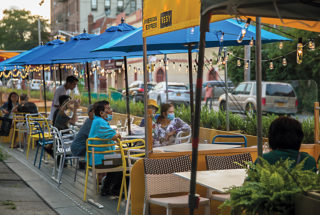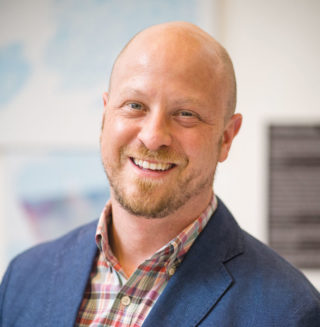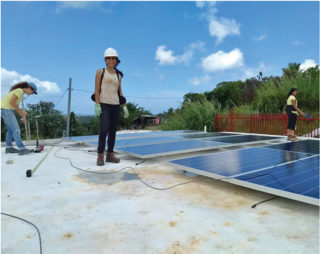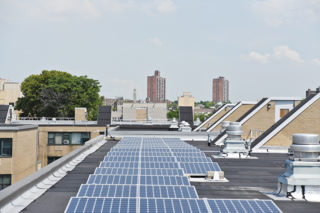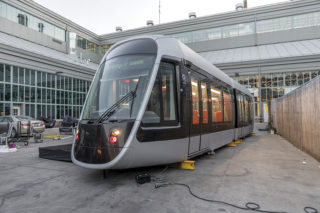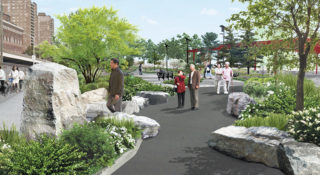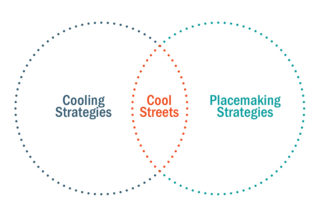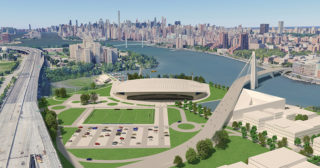
After living in Denmark for two months this summer, I felt like I was traveling back in time when I returned to New York City. Copenhagen’s green streets are dominated by pedestrians, bikes, and virtually silent electric buses. The city of 1.3 million is on track to be carbon neutral by its set goal of 2025, and the whole country may be net zero in energy usage by 2030. As I inched across Downtown Manhattan en route from Newark Airport to Brooklyn, roads clogged with gas-fueled cars and trucks, I got a bit dizzy thinking about how much catching up we have to do here in the U.S. Or maybe it was just the fumes.
The fact is, time is running out to address climate change. New Yorkers passing through Union Square can now be reminded of this thanks to a reprogramming of Metronome, the multimedia art installation by Andrew Ginzel and Kristin Jones. To mark the end of Climate Week in late September, Metronome’s digital display started counting down seven years and a little over 103 days. This is the amount of time until the effects of global warming become irreversible, according to Andrew Boyd and Gan Golan, the creators of the so-called “Climate Clock” now integrated into Metronome.
In 2020, most of humanity experienced how changes in the global climate can ultimately impact every aspect of our lives. Some scientists believe the genesis of the coronavirus pandemic may be traceable to new interactions of animal species caused by climate change. The forest fires that have devastated Australia and the Western United States certainly were made much worse by climate change. As we confront these catastrophic events here in the U.S., some communities are much more affected than others. How we address climate change and its effects is a social justice issue.
In the pages that follow, we spotlight architects, developers, and innovators who are actively engaging with climate justice. This work may take many forms, but at heart it is about supporting the human right to live in a healthy, clean, and safe environment. It is also about looking ahead: envisioning equal access to green space amid a dense city; financing projects whose positive benefits may be modest and incremental rather than spectacular and immediate; and planning systems that are agile and flexible enough to withstand a more volatile climate in the future.
Like the Summer issue, this Fall issue is once again a product of working 100% remotely, as we take precautions to prevent the spread of COVID-19. A big thank you is in order to all our editorial and publishing staff involved at every stage of the production process for their patience, diligence, and commitment to keeping up high standards in this challenging time.
I’m saddened to close another letter with a brief tribute to someone who has passed away in recent months, design writer and Oculus contributor Deborah Wilk. I met Deb when she was a senior editor at Interior Design magazine, and I was always impressed with her tenacious reporting, keen eye, and wicked dry wit, as well as her skill at weaving all that into a smart, snappy narrative. In addition to her role at Interior Design, Deb held editorial staff positions at the Chicago-based New Art Examiner, the Chicago Tribune, Chicago Magazine, and Art + Auction, among other publications. She was steeped in the world of art and design, and we were lucky to count her as a contributor to Oculus over the last few years. Deb wrote in-depth features for us on a range of topics, including how architects were experimenting with virtual and augmented reality, and how firms were addressing issues of equity in their own studios. She suffered from a long-term illness that led to her death earlier this year at the age of 54. Deb, we’ll miss you.








